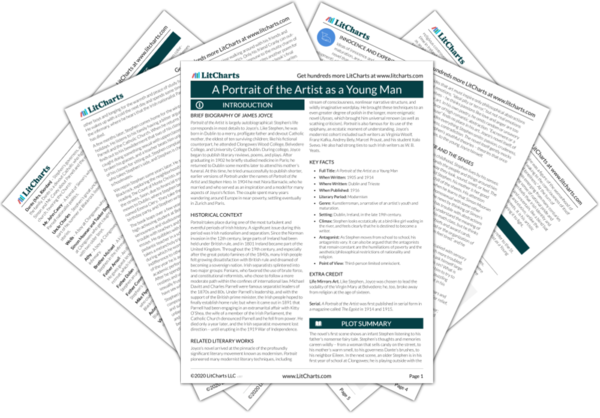Summary
Analysis
Stephen, now sixteen years old, is a student at Belvedere, a Jesuit school. It is the end of his second year, and he is the second-best student in his class. He has been cast in a school play, taking the role of a stern and foolish teacher because of his height and serious manners. He is waiting for his turn backstage amidst the general clutter and tumult, which begins to annoy him, so he walks out of the school into the garden and watches the muffled noise and lights of the theatre from a comfortable distance. From afar, the music perfectly expresses his confused feeling, and he feels his emotions flow outward from him.
Stephen continues to endure his social life in much same way as at the children’s party in Blackrock: though he apparently participates, he experiences a steady mixture of alienation, boredom, and contempt. He can only enjoy the tumult from afar, as an observer. There, he can transform experience into description. Music seems to connect the spheres of his inner and outer life by calling his emotion out into the world.
Themes
Quiz
Test Yourself
A little ways away, a few of Stephen’s friends stand smoking cigarettes. Heron, Stephen’s closest friend, mentions that he saw Stephen’s father walking in to the school with a pretty girl, who the boys assume is Stephen’s girlfriend. Stephen thinks it must be E____ C____, the girl he almost kissed in the tram two years earlier, and feels angry at his friends for making light of an incident that was so meaningful for him. He has recently been thinking about her and about the poem he wrote for her.
Stephen feels alienated from others partly because he constantly forces himself to conceal his real feelings, which he judges as shameful or unsuitable. To his mind, the world he lives in has no room for the sort of high, romantic ambitions that consume him. Therefore, as a defensive mechanism, he conceals and disguises much of his inner life.
Themes
Quiz
Test Yourself
Soon enough, though, Stephen begins joking with his friends. “Admit!”, Heron says, to get Stephen to confess his secret relationship with the girl (which has not actually taken place). The word calls up for Stephen a memory from the previous year, when he got into an argument with Heron and a few other boys about their favorite writers. Stephen insisted that Byron was the greatest poet but the other boys objected that Byron was a heretic. Half-jokingly, the other boys pinned Stephen down to force him to admit that Byron wasn't good as a poet or as a man. Stephen wrestled free and ran away; somehow, he notes, he does not hold a grudge for this humiliation. That same day, a teacher had accused Stephen of writing heretical thoughts in an essay. Stephen had written that people can never come closer to god, but with the teacher’s prompting corrects himself to say that people can never reach god.
Despite Stephen’s high academic standing and apparent good behavior, several incidents indicate his deviation from the religious mold. His intellectual strength and curiosity have led him into opinions that are somewhat unorthodox, both in his conversations with his friends and in his school assignments. Something about his recent romantic angst and general intellectual reshuffling has put him slightly at odds with his highly religious environment. We note, also, that even his irreverent friendships seem to be modeled in some instances on clerical relationships, like that between a priest and a confessor.
Themes
Quiz
Test Yourself
A boy comes to call Stephen back to the theatre, because it’s almost time for him to go onstage. Heron thinks the summons is rude, but Stephen doesn’t care, and he notes to himself his indifference to such customs. He feels many different voices around him instructing him to be many different things: a gentleman, a catholic, a nationalist, a savior of the family. But he wants only to ignore these voices and to attune himself to his ghostly thoughts and feelings.
The scene crystallizes Stephen’s immersion in inner life and estrangement from worldly life – two aspects of his existence that he often designates as “soul” and “body” (since the body, unlike the hidden, immaterial soul, is inevitably a part of worldly life). Stephen doesn’t want to attach his soul to any external, communal cause.
Themes
Quiz
Test Yourself
Get the entire Portrait of the Artist LitChart as a printable PDF.

Backstage, a man paints Stephen’s face to make him look middle-aged, but the thought of the girl waiting for him in the audience makes him feel truly young for once. He goes onstage and plays his part with ease. Afterwards, he takes off his costume and rushes outside, but no girl is waiting for him. He storms off in painful disappointment, leaving his family behind. He looks at a morgue across the street and breathes in the smells of horse urine and decay; somehow, the smell calms him down.
Though Stephen is only sixteen, his estrangement from others makes him feel much older. The joke, here, is that he happens to feel young only when he is disguised to look old. Though teenage Stephen thinks that he loves beautiful things, we come to notice slowly that he loves hideous things as well. Strong sensory impressions of any kind restore his sense of reality.
Themes
Quiz
Test Yourself












